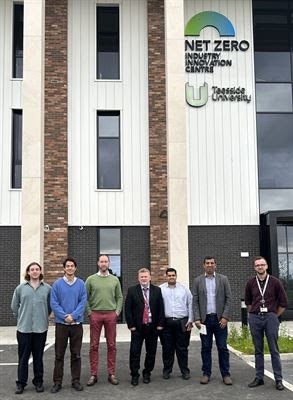A vital step towards removing excess carbon dioxide from the atmosphere is to be trialled in the Tees Valley as a result of a partnership between Teesside University and Airhive, an innovative climate technology company.

Image Credit: Teesside University
Academics at the University’s Net Zero Industry Innovation Centre (NZIIC) are collaborating with Airhive, a British startup developing a novel Direct Air Capture (DAC) technology.
The partnership will see the first industrial-ready demonstration unit of Airhive's patented DAC technology be built and tested in the heart of the UK’s first and largest Net Zero Cluster.
‘Project TENET’ (TEesside Negative Emissions Technology) has been part-funded by Tees Valley Launchpad, a collaborative research and development fund established by Innovate UK, part of UK Research and Innovation.
A demonstration unit with the potential to extract up to 80 tons of carbon dioxide from the atmosphere each year will be developed, constructed, and installed at the NZIIC.
Over the course of 12 months, Airhive will work with material scientists and chemical engineers at the University to monitor and improve the system’s effectiveness, and inform designs for larger-scale units that will be deployed later in 2024. Installation and initial testing will begin at the NZIIC in early December.
The technology works by pulling air through its system and facilitating the reaction of carbon dioxide with a sorbent composed of safe, low-cost natural earth minerals, using a process called fluidisation.
The carbon dioxide can then be chemically extracted from the sorbent and safely stored or used in industry.
Project TENET also explores the potential for the technology to have integrated thermochemical energy storage, allowing the heat generated in the chemical reaction to be stored and used to itself power the system.
Rory Brown, CEO of Airhive, said "This is the first demonstration-scale version of our direct air capture technology, and there is no better place to build it in the UK than Teesside, with its long, proud industrial history and its pivotal role in the UK's net zero future.
“Ultimately our ambition is for the Tees Valley to be where we build our first commercial facility, capable of removing tens of kilotons of carbon dioxide every year.
“We’re therefore delighted to be working with Teesside University and wider stakeholders in the Tees Valley to help us deliver this ambitious project.”
Dr Humbul Suleman, a Senior Lecturer in Chemical Engineering in the School of Computing, Engineering & Digital Technologies, who is leading the project, said: “The UK government’s Net Zero strategy aims to have engineered removals, such as DAC, extracting five megatons of carbon dioxide a year by 2030.
“Project TENET will play an important role in advancing DAC technology development and deployment in the UK, which will be key to delivering this target.”
Gari Harris, Director of the NZIIC, added: “The NZIIC is already establishing a green legacy for the Tees Valley though its work with industry supporting innovation and skills development.
“This project will build upon this work and help to further position Teesside firmly at the heart of the UK’s green industrial revolution.”